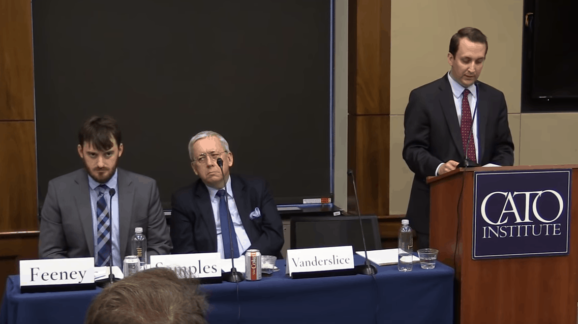VIDEO: Government Should Not Regulate Social Media Content

Disputes over social media have rocketed to the top of the national political agenda recently, whether it is the desire of Sen. Elizabeth Warren (D-MA) to break up Facebook, claims that Twitter is practicing viewpoint discrimination against conservatives, or worries that people trying to capture the perfect Instagram selfie are being eaten by bears. Fortunately our friends John Samples and Matthew Feeney from the Cato Institute are here (in the video below) to set policymakers straight on some of these poorly-thought-out proposals.
Samples is the author of the new Cato study “Why the Government Should Not Regulate Content Moderation of Social Media,” which reaffirms the truth that the government shouldn’t be stepping in to regulate private speech, while also pointing out that it’s not just conservatives who have been complaining about social media content moderation:
President Trump recently complained that Google searches are biased against Republicans and conservatives. Many conservatives argue that Facebook and Google are monopolies seeking to restrict conservative speech. In contrast, many on the left complain that large social media platforms fostered both Trump’s election in 2016 and violence in Charlottesville in 2017. Many on both sides believe that government should actively regulate the moderation of social media platforms to attain fairness, balance, or other values.
Yet American law and culture strongly circumscribe government power to regulate speech on the internet and elsewhere. Regulations of social media companies might either indirectly restrict individual speech or directly limit a right to curate an internet platform. The First Amendment offers strong protections against such restrictions. Congress has offered additional protections to tech companies by freeing them from most intermediary liability for speech that appears on their platforms. The U.S. Supreme Court has decided that private companies in general are not bound by the First Amendment.
As the Competitive Enterprise Institute’s own Wayne Crews has pointed out, the real sin we should be policing among tech companies is not sorting content according to their own guidelines, but getting in to bed with government:
…members of Congress like Sen. Mark Warner (D-VA) are circulating a slate of proposals to regulate content and speech on the Internet. Proposals to regulate what happens in online forums are generally sold as a way to punish or discipline the companies that host them, but users should understand that Facebook, and other large platform of today, would actually benefit from government regulation. While initially inconvenient to comply with, this approach would tend to make them permanent parts of the media landscape, immune to competition. If regulators treat them as essential facilities, then that is what they become, making true competition impossible.
Worse still, government tentacles working their way into online platforms could mean actual censorship gets written into the way online speech is regulated. Wayne again, responding to Facebook founder and CEO Mark Zuckerberg’s Washington Post op-ed calling for more federal involvement in industry practices:
…Zuckerberg posits that “Regulation could set baselines for what’s prohibited and require companies to build systems for keeping harmful content to a bare minimum.”
Who decides what is “harmful content” or “hate speech”—or “blasphemy”? Allegedly impartial third parties can have biases of their own; moreover, harm is clearly in the eye of the beholders, a class that will surely expand after any content regulation is implemented.
While Facebook is free to and should establish its own oversight board, the policy imperative is different. Congress must ensure that rest of the Internet is protected from any subsequent regulatory predation or coercive pressure for adoption of speech guidelines beyond what companies do themselves. Large companies would benefit from such regulation, as Zuckerberg himself has acknowledged.
See also Iain Murray’s blog post from earlier this month on how Zuckerberg seems to have swapped his enthusiasm for disruptive innovation (i.e., “move fast and break things”) for bureaucratic backside-covering.